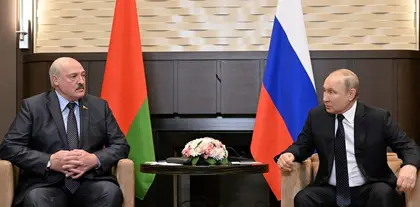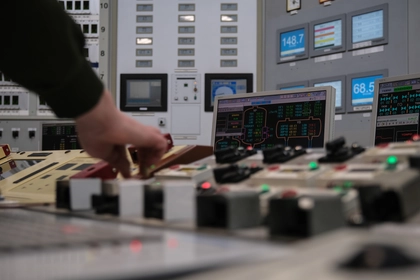Belarus has served as a staging ground for Russia’s intervention in Ukraine, but strongman Alexander Lukashenko has so far avoided becoming a party to the conflict.
Observers stress that there is no end in sight for Moscow’s more than four-month military campaign in Ukraine and do not rule out that Belarus could still be dragged into it, too.
JOIN US ON TELEGRAM
Follow our coverage of the war on the @Kyivpost_official.
Artyom Shraibman, a non-resident scholar at the Carnegie Endowment for International Peace, said that Lukashenko was keenly aware of the fact that most Belarusians do not support sending troops into Ukraine.
But that does not mean that President Vladimir Putin will not try to put pressure on Lukashenko and that Belarus will not join the offensive in the future.
“There are no rational reasons — or irrational reasons for that matter — for Minsk to join, for Lukashenko to join,” Shraibman told AFP.
“What is Putin capable of doing? Will he be able to force Lukashenko to join? It’s an open question.”
Lukashenko has sought to promote himself as Putin’s most faithful ally, welcoming Russian troops under the pretext of military exercises before Moscow launched its Ukraine offensive, trying and failing to take the capital Kyiv.
He has also argued that had Moscow not intervened, Ukraine would have attacked Belarus.
Despite officially being a non-belligerent, the Belarus strongman has demanded that his country be included in any talks and a deal to end the conflict.

Thinking Out Loud – Where We’re at, What’s at Stake, and What Ronald Would Have Said
Ukrainian President Volodymyr Zelensky said this week that Kyiv did not believe Minsk would be dragged into the conflict.
“But there are and will be provocations,” Zelensky said.
“There is a threat of Belarus getting involved.”
– ‘Zero combat experience’ –
Tensions between Ukraine and Belarus have been growing.
In early July, Lukashenko said his army had shot down missiles fired into their territory from Ukraine and vowed to respond “instantly” to any enemy strike.
Putin has said that Moscow will deliver Iskander-M missiles capable of carrying nuclear weapons to Belarus “in the coming months”.
Shraibman, who fled Lukashenko’s repressive regime in 2021, pointed out that the Belarusian strongman provided the necessary logistical support for Russia but has conspicuously refrained from sending troops to Ukraine.
“I’m not sure the Belarusian army would add much,” he said.
“It’s way more reasonable to keep them on the border, to keep Ukrainians on alert on the border, rather than moving the few battalions Belarus has into war.”
Russian military analyst Alexander Khramchikhin struck a similar note, saying Minsk’s involvement in the conflict was unlikely.
“The Belarusian army has zero combat experience compared to both the Ukrainian and Russian armies,” he said.
“Its combat value is very low.”
He said it was more useful for Putin to use Belarus to maintain “a certain tension” on the border with Poland.
Nevertheless, he said, if the Belarusian troops were to attack, “it will create quite significant additional stress for Ukraine, because it will be an attack from a new direction.”
Experts say Belarus’s role in the Ukraine offensive will ultimately depend on what Putin wants.
Lukashenko, 67, is heavily dependent on the Russian leader militarily and economically.
When unprecedented protests rocked Belarus in 2020 over an election the opposition says he stole, the moustachioed leader relied on Moscow to stabilise his position.
– ‘Peaceful nation’ –
Political analysts say that if Lukashenko goes to war against Ukraine he risks reigniting the mass protests that shook his rule in 2020-2021.
“I think President Lukashenko is well aware that this will not be something that will strengthen his popularity in the country,” Kremlin-connected political analyst Fyodor Lukyanov told AFP.
According to a June poll by the British think-tank Chatham House, 43 percent of Belarusians do not support the Russian offensive in Ukraine.
Only 4 percent would back the involvement of the Belarusian army.
Veronica Laputska, co-founder of the think-tank EAST Center in Warsaw, said that the Belarusian people sustained huge losses during World War II when around one in four died and were deeply averse to “any type of violence”.
“Belarusians are a very peaceful nation,” she said.
You can also highlight the text and press Ctrl + Enter






